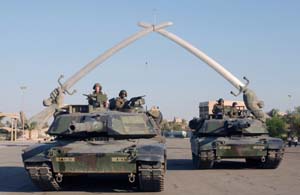
 Deadlock persists between Iran and the West over the controversial Iranian nuclear program. Even though another round of talks has been proposed, the grapevine gaining momentum in diplomatic & strategic circles is that the attack on Iran is “not a matter of if, rather when.” In other words, the US will resort to military option against Iran. But this war cry appears to be far-fetched. There are many reasons why armed conflagration between Iran and the West is improbable.
Deadlock persists between Iran and the West over the controversial Iranian nuclear program. Even though another round of talks has been proposed, the grapevine gaining momentum in diplomatic & strategic circles is that the attack on Iran is “not a matter of if, rather when.” In other words, the US will resort to military option against Iran. But this war cry appears to be far-fetched. There are many reasons why armed conflagration between Iran and the West is improbable.Prima facie, the situation looks similar to what was in 2003 just prior to American invasion of Iraq. There is a sense of déjà vu among the observers. But it needs to be kept in mind that Iran is not Iraq. At that time, Iraq was an isolated country. Cutoff almost entirely from the rest of the world, Baghdad didn’t have any friends in the neighbourhood. Also, Iraq was a dictatorship. Saddam Hussein’s tyrannical & despotic rule had made him a villain in his own country. Iran is different in the sense that it is a functioning democracy, where people enjoy a certain degree of political freedom and economic independence and relatively high standard of living. Hence, domestic opposition to the regime remains miniscule, notwithstanding American attempts to engineer Colour revolution in Iran since 2009 on the lines of Eastern Europe & Central Asia. Moreover, Iran’s conventional military firepower is way more developed than that of Saddam’s Iraq, boasting of a stockpile of ballistic missiles, fighter aircraft, submarines etc. After the not-so-pleasant Iraqi experience, the world is skeptical about Washington’s claims that Tehran is pursuing a clandestine nuclear weapons program; since similar accusation of Baghdad possessing the Weapons of Mass Destruction (WMDs) was the pretext on which the US launched ‘Operation Iraqi Freedom’ in 2003. However, no WMD has been found till date.
A lot has changed since then. America is not the America of 2003, when it could unilaterally act at will & the world had no other option than to follow Uncle Sam. In the past decade, the world has witnessed the rise of China and India and resurgence of Russia on the world stage, along with simultaneous relative decline of the West. These countries don’t readily support American stand on Iran. Therefore, it will be an uphill task for the US to garner international support in the UN & other international fora as any such unilateral step is bound to be met with stiff resistance by these emerging powers. Russian Foreign Minister Sergei Lavrov has already warned that a military strike against Iran would be “a great mistake, followed by a catastrophic outcome.” China and India have also advocated diplomatic solution to the crisis.
Despite all these constraints, if at all, the US decides to go ahead with the war option against Iran, there could be two scenarios. In the first case, the US, along with Israel, will directly involve into the war, using its military assets in the region, though it seems impractical since Israel will have to cross the Iraqi territory in order to reach Iranian nuclear sites, and Baghdad has clearly stated that it won’t allow the use of its airspace by Israeli Air Force. When faced with an attack, the first & the most expected reaction of Iran would be the shutting down of the crucial Strait of Hormuz. US Navy’s big aircraft carriers and warships are simply redundant when it comes to combating the small fast attack boats & naval mines planted by the Iranian elite force Iranian Revolutionary Guard Corps (IRGC). On economic front, closure of the Strait will instantly result in skyrocketing of oil prices in the international market, which will not augur well for the fragile economies of America and Europe.
In a more unlikely second scenario, the US could incite its Sunni proxy in the region and staunch enemy of Shi’ite Iran, i.e. Saudi Arabia to carry out surgical strikes on Iranian nuclear facilities. Riyadh would be wise enough not to do so as it may stir up revolt in its own oil rich Shia-dominated eastern provinces and also in Shi’ite Bahrain, home to the United States Sixth Fleet. Hence, this step has the potential to escalate the clash into a full-fledged regional conflagration. Post Arab Spring, the anti-Iranian sentiment in the region has apparently subdued as regional heavyweights like Egypt & Turkey are now pursuing more pro-Tehran policies. They would also be reluctant to support any US-sponsored armed initiative against Tehran.
Since this is the election year in America, lobbying in Washington D.C. is at its peak. In order to win the election again, President Obama would need the support of both the Left & the Right. He will have to walk a tightrope between pro-Israeli, anti-Iran American Israeli Public Affairs Committee (AIPAC) lobby and Military Industrial Complex on the one hand, which are pushing the administration to ‘punish’ Iran; and Oil Companies on the other, whose assets worth billions of dollars in the region are at stake & they would not want any kind of instability in the region to hurt their business interests.
About author: Sameer Jafri is a freelance political analyst based in India. He writes on global, geopolitical, economic and environmental issues. He can be reached at- sameer.jf@gmail.com
You can publish this article on your website as long as you provide a link back to this page.

Be the first to comment